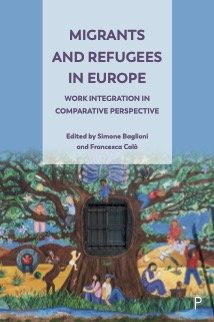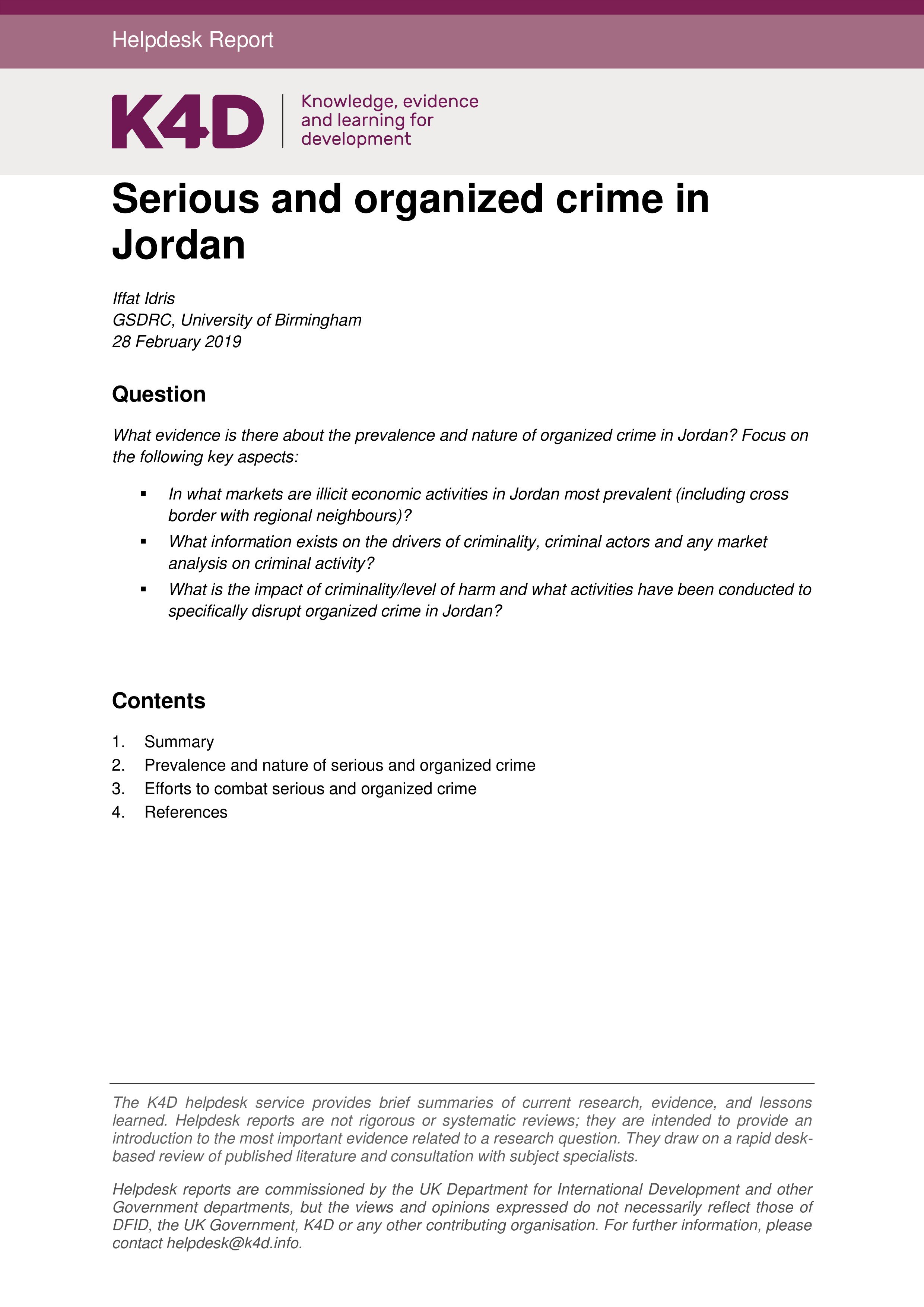By Iffat Idris GSDRC, University of Birmingham 28 February 2019
This review presents findings on the prevalence and nature of serious and organized crime1: in Jordan, and efforts to combat this. The extremely limited literature on the topic indicates that Jordan has low levels of serious and organized crime: the main forms are smuggling of goods and drugs, and human trafficking. The influx of large numbers of Syrian refugees has promoted crime within refugee camps, but the impact on crime in Jordan overall appears limited.
The review drew on academic and grey literature, as well as media reports. It found very little literature on the topics covered in the query, and nothing on the links between tribal groups and organized crime or on specific drivers of crime. The dearth in literature is perhaps a reflection of low levels of organized and serious crime in Jordan – though, without data on this, it is impossible to assert this definitively. The United Nations Office on Drugs and Crime (UNODC) (2016: 13) highlights the problem of lack of data on serious and organized crime across the Middle East:
In general, data on drugs, drug use, HIV, people living in closed settings, crime, corruption and terrorism in the region are scarce. Analytical studies on the profile of organized criminal groups involved in illicit trafficking, their modus operandi and the routes used are very limited, as is information on the relationship between organized crime and terrorism. This can be the result of a lack of capacity and/or infrastructure to generate, manage, analyse and report data, or the lack of or poor coordination amongst the relevant institutions.
Key findings of the review are as follows:
Crime statistics – There is a dearth of crime statistics for Jordan, but available figures point to a rise in crime in recent years, notably murder, aggravated assault and kidnapping. A total of 24,000 crimes were recorded in 2016 (OASC, 2018).
Smuggling – Jordan’s long and remote desert borders with neighbouring countries make it susceptible to smuggling of cash, gold, fuel, narcotics, cigarettes and other contraband. Smuggling into Jordan tends to be small-scale, largely fuel and cigarettes. With regard to drugs, Jordan is more a corridor country than a destination point: the main drugs being captagon, heroin, hashish and marijuana. Large quantities of narcotics were seized by the authorities in 2017: increased seizures point to a rise in narcotics smuggling.
Money laundering and corruption – Jordan is not considered a hub for money laundering. Corruption is a bigger problem: Jordan ranked 52nd (out of 140 countries) for incidence of corruption (WEF, 2018: 313). Government efforts to contain and prosecute corruption have not been effective.
Trafficking – Jordan is a source, transit, and destination country for adults and children subjected to forced labour, domestic servitude, and sex trafficking. Trafficking victims in Jordan are primarily from South and Southeast Asia, East Africa, Egypt, and Syria; refugees from Syria, the Palestinian Territories, and Iraq are especially vulnerable to trafficking. Forced labour victims in Jordan experience withheld or non-payment of wages, confiscation of identity documents, restricted freedom of movement, unsafe living conditions, long hours without rest, isolation, and verbal and physical abuse. Diverse migrant women can be forced into prostitution: those who migrated to Jordan to work in restaurants and nightclubs; Egyptian women married to Jordanian husbands; out-of status domestic workers from Indonesia, the Philippines, Bangladesh, and Sri Lanka who have fled their employers; Iraqi refugee women who have to provide for their families.
Crime in Syrian refugee camps – the literature indicates that, while crime is prevalent in Syrian refugee camps, it is not serious in nature: largely smuggling of camp vouchers and goods, though one report notes that the camps’ proximity to border areas of conflict makes them susceptible to smuggling and drug trafficking. While there are reports of a rise in crime in Jordan overall, this is attributed to economic pressures rather than the influx of Syrian refugees into the country.
Regional findings – A brief examination of serious and organized crime in the wider Middle East and North Africa (MENA) region points to a post-Arab Spring rise in transnational organized crime – facilitated by public disorder, deterioration in capacity of state law enforcement agencies, and economic hardship. Jordan is not explicitly mentioned, but given its geographic location, would likely be a target for such transnational crime networks.
Key findings of the review with regard to efforts to combat serious and organized crime in Jordan are as follows:
Agencies - A number of government agencies are involved in combating serious and organized crime, including trafficking. Key among these is the Public Security Directorate (PSD), which includes the Anti-Narcotics Department. The PSD and Ministry of Labour have a joint Anti-Trafficking Unit.
Legislation – The Anti-Human Trafficking Law was passed in 2009 but there are shortcomings with regard to meeting international standards in both the legal provisions and, even more, in enforcement. Challenges with the latter include victims being too afraid to file complaints, repatriation of victims, non-availability of evidence, and perpetrators being located out of the jurisdiction/reach of the country or hidden from the police. Jordan's Penal Code criminalizes corruption, including abuse of office, bribery, money laundering and extortion, but again the law is not implemented effectively.
Support from international partners – The UN Office on Drugs and Crime (UNODC) is the main international development organization supporting the Govt. of Jordan to combat serious and organized crime. Its interventions are often part of wider regional programmes, notably the Airport Communication Project (AIRCOP) which strengthening the capacities of international airports to detect and intercept drugs, other illicit goods and high-risk passengers (including foreign terrorist fighters), and the Container Control Programme (CCP) which helps member states strengthen their border control capacity and detect illicit goods in cargo containers. Interventions by other development partners include an EU project to combat human trafficking (JEMPAS) and the UK Jordan Security Sector Programme, aimed at reducing internal security threats in Jordan. etc.
K4D Helpdesk Report 537. Brighton, UK: Institute of Development Studies.
Birmingham, UK: University of Birmingham, 2019. 13p.






